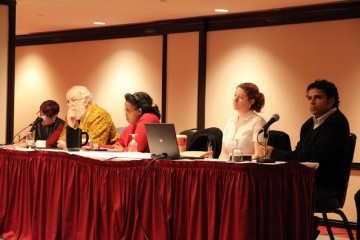Article written by Sara Eftekhar, UBC Nursing Student
The Cuts to Refugee Health Care continues to be an important human rights issue in Canada.
On June 30, 2012, the federal government implemented cuts to its Interim Federal Health Program (IFHP), funded by Citizenship and Immigration Canada (CIC), which provided basic health coverage for refugees, refugee claimants and certain other non-citizens. The cuts meant that many refugees living in Canada were no longer eligible for the coverage of certain necessary medications such as insulin, prenatal care for pregnant women and mental health services.
Many health care professionals who provided care to refugee populations across Canada were outraged by the health care cuts recognizing that these cuts were going to further oppress this vulnerable population and in the long run cost the tax payers more money than the IFH program itself.
Consequently, health care professionals across Canada supported by numerous national organizations such as the Canadian Council for Refugees, a non-profit umbrella organization committed to the rights and protection of refugees in Canada advocated for the protection of refugee health care services by organizing a national day of action, organizing demonstrations, press conferences and various other public events.
As a result of the public pressures, late on June 29th, the federal government made partial changes to the IFH cuts by continuing some of the services they previously provided by IFH to those classified as government assisted refugees. However, it still left many refugees hopeless and there was more to be done to persist the government to keep the IFH program. Hence, the physicians behind the demonstrations and awareness campaigns decided to form a group called “Doctors for Refugee Care” (http://www.doctorsforrefugeecare.ca/).
On November 29th to December 1st 2012, Canadian Council for Refugees had their Fall Consultation in Toronto to discuss a year of big changes for refugees especially in terms of IFH. As a result, a workshop called “Refugee health at risk: Impacts of IFH cuts” as well as a working group was created to discuss how to continue to take action.
Dr. Meb Rashid a family physician who has worked extensively with newly arrived refugees at Crossroads Clinic at Women’s College Hospital in Toronto and one of the key physicians behind Canadian Doctors for Refugees spoke at The Canadian Council for Refugees Consultation urging health care professionals as well as students to document any cases of refugees being denied access to care in order to keep raising awareness about the issue. To help aid the documentation process, the Canadian Doctors for Refugees website has created the Refugee Health Outcome Monitoring and Evaluation System to monitor the impacts the IFH by sharing patient stories through an online survey found at: http://www.surveymonkey.com/s/66KPGVS
Dr. Rashid explained at the consultation “the IFH continue to be an important issue for many refugees in Canada. After the changes, some refugee claimants are still denied access to a physicians and health care services unless they are a threat to public health or safety. There is still a lot of confusion and anxiety with the IFH cuts amongst health care providers and many clinics are not up to date or often familiar with the different status that refugees may have and may end up turning down all refugees for health care.”
The cuts also vary from province to province which has added to the confusion of health care professionals. In British Columbia, Refugee Health Vancouver (http://www.refugeehealth.ca/) has a guide about refugee coverage specifically in BC and can be used anytime by health care professionals so that they are informed of the up to date policies.
Article 25 in the United Nations Declaration of Human rights states that “everyone has the right to a standard of living adequate for the health and well-being of himself and of his family, including medical care and necessary social services, and the right to security in the event of sickness, disability, widowhood, old age or other lack of livelihood in circumstances beyond his control” and the cuts to refugee health care in Canada is a violation of human rights.
The Canadian Council for Refugees are continuing their campaign against the IFH cuts and have several action plans. For more information and ways to get involved you can visit http://ccrweb.ca/en/ifh.
